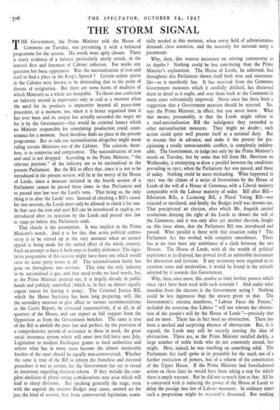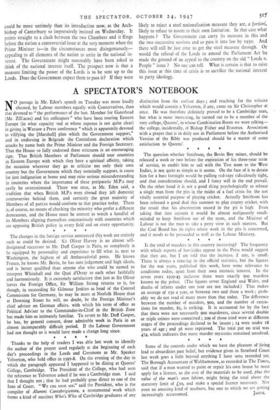THE STORM SIGNAL
THE Government, the Prime Minister told the House of Commons on Tuesday, was presenting it with a balanced programme for the session. His words were aptly chosen. There is every evidence of a balance particularly nicely struck, in the interest first and foremost of Cabinet cohesion. For weeks one question has been uppermost. Was the nationalisation of iron and steel to find a place in the King's Speech ? Certain ardent spirits in the Cabinet were known to be demanding that to the point of threats of resignation. But there are some forms of madness of which Ministers as a whole are'incapable. To throw into confusion an industry second in importance only to coal at a moment when the need for its products is imperative beyond all peace-time precedent, at a moment, too, when it is better organised than it has ever been and its output has actually exceeded the target set for it by the Government—that would be criminal lunacy which no Minister responsible for stimulating production could coun- tenance for a moment. Steel therefore finds no place in the present programme. But to rule out nationalisation altogether might mean ruling certain Ministers out of the Cabinet. The solution, there- fore, is to temporise and compromise. The nationalisation of iron and steel is not dropped. According to the Prime Minister, " the relevant portions " of the industry are to be nationalised in the present Parliament. But the Bill to effect that, since it is not to be introduced in the present session, will lie at the mercy of the House of Lords, since a measure initiated in the fourth session of a Parliament cannot be passed three times in that Parliament and so passed into law over the Lord's veto. That being so, the only thing is to alter the Lords' veto. Instead of checking a Bill's career for two sessions, the Lords must only be allowed to check it for one. In that case the iron and steel Bill can be introduced in 1948-9, re- introduced after its rejection by the Lords and passed into law in 1949-50 before this Parliament ends.
That clearly is the assumption. It was implicit in the Prime Minister's words. And it is for this that acute political contro- versy is to be stirred up at the very moment when an earnest appeal is being made for the united effort of the whole country. Such an attempt to have it both ways is frankly dishonest. The legis- lative programme of this session might have been one which would raise no acute party issues at all. The nationalisation battle has gone on throughout two sessions. This time the only industry to be nationalised is gas, and that need evoke no hard words, for, as the Prime Minister pointed out, it is largely already in public hands and publicly controlled (which is, in fact an almost equally cogent reason for leaving it alone). The Criminal Justice Bill, which the Home Secretary has been long preparing, will, like the secondary measure to give effect to various recommendations in the Curtis Report, be criticised constructively, if at all, in all quarters of the House, and can expect as full support from the Opposition as from the Government benches. The same is true of the Bill to abolish the poor law and perfect, by the provision of a comprehensive system of assistance to those in need, the great social insurance system which will enter into full force next July. Legislation to readjust Exchequer grants to local authorities and relieve what has in many areas become the almost intolerable burden of the rates should be equally non-controversial. Whether the same is true of the Bill to reform the franchise and electoral procedure is not so certain, for the Government has yet to reveal its intentions regarding electoral reform. If they include the com- plete abolition of plural voting cortiderations may arise which will lead to sharp divisions. But speaking generally the stage, even with the anguish the autumn Budget may cause, seemed set for just the kind of session, free from controversial legislation, essen- tially needed at this moment, when every field of administration demands close attention, and the necessity for national unity is paramount.
Why, then, this wanton insistence on stirring controversy to its depths ? Nothing could be less convincing than the Prime Minister's explanation. The House of Lords, he admitted, had throughout this Parliament shown itself both wise and statesman- like—as it manifestly has. It has received from the Commons Government measures which it cordially disliked, has discussed them in detail as it ought, and sent them back to the Commons in many cases substantially improved. Never once has there been a suggestion that a Government measure should be rejected. No, says the Prime Minister, in effect, but you never know. What that means, presumably, is that the Lords might refuse to a steel-nationalisation Bill the indulgence they extended to other nationalisation measures. They might no doubt such action could quite well present itself as a national duty. But to assume that in advance, and make it the pretext for pre- cipitating a totally unwarrantable conflict, is completely indefen- sible. The Government, to judge not only by the Prime Minister's words on Tuesday, but by some that fell from Mr. Morrison on Wednesday, is attempting to draw a parallel between the conditions prevailing in 1911, when the Parliament Act was passed, and those of today. Nothing could be more misleading. What happened in 1911 was the climax of a series of frustrations by the House of Lords of the will of a House of Commons with a Liberal majority comparable with the Labour majority of today. Bill after Bill— Education Bills, a Licensing Bill, a Plural Voting Bill—was rejected or mutilated, and finally the Budget itself was thrown out. That precipitated an election, after which Mr. Asquith carried resolutions denying the right of the Lords to thwart the will of the Commons, and it was only after yet another election, fought on this issue alone, that the Parliament Bill was introduced and passed. What parallel is there with that situation today ? The Parliament Act has worked with complete smoothness. There has at no time been any semblance of a clash between the two Houses. The House of Lords, with all the wealth of political experience at its disposal, has proved itself an admirable instrument for discussion and revision. If any testimony were required to its common sense and moderation, it would be found in the attitude adopted by it towards this Government.
Why, then, once more, this resolve to limit further powers which since 1911 have been used with such restraint ? And under what mandate from the electors is the Government acting ? Nothing could be less ingenuous than the answer given to that. The Government's election manifesto, " Labour Faces the Future," included the assertion that Labour " will not tolerate the obstruc- tion of the people's will by the House of Lords "—precisely that and no more. There has in fact been no obstruction. There has been a marked and surprising absence of obstruction. But, it is argued, the Lords may still be secretly nursing the idea of obstruction. There are, as the Prime Minister recalled darkly, a large number of noble lords who do not commonly attend, but might. Here, indeed, he was touching on something solid. The Parliament Act itself spoke in its preamble for the need, not of a further restriction of powers, but of a reform of the constitution of the Upper House. If the Prime Minister had foreshadowed action on those lines he would have been taking a step for which there is ample warrant. But he did not so much hint at that. All he is concerned with is reducing the power of the House of Lords to delay the passige into law of Labour measures. In ordinary times such a proposition might be reasenali'v discussed. But nothilig could be more untimely than its introduction now, as the Arch- bishop of Canterbury so impressively insisted on Wednesday. It points straight to a clash between the two Chambers and it flings before the nation a controversial issue at the very moment when the Prime Minister is—in the circumstances most disingenuously— appealing to all elements of the nation to unite in the national in- terest. The Government might reasonably have been asked to think of the national interest itself. The prospect now is that a measure limiting the power of the Lords is to be sent up to the Lords. Does the Government expect them to pass it? If they were likely to reject a steel nationalisation measure they are, a fortiori, likely to refuse to assent to their own limitation. In that case what happens ? The Government can carry its measure in this and the two successive sessions and so pass it into law by 195o. And there will still be just time to get the steel measure through. Or would the refusal of the Lords to amend the Parliament Act be made the ground of an appeal to the country on the old " Lords v. People " issue ? No one can tell. What is certain is that to raise this issue at this time of crisis is to sacrifice the national interest to party ideology.

































 Previous page
Previous page